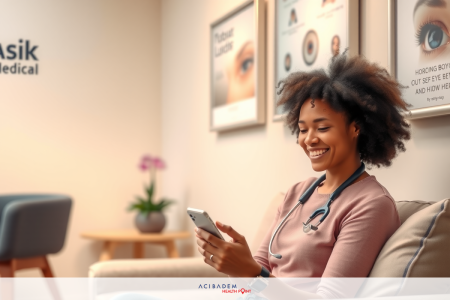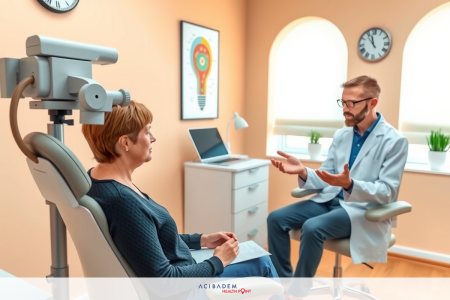Can Hypertropia Be Cured?
Can Hypertropia Be Cured? Hypertropia makes one eye look up. It changes how well you see things. You might wonder, Can Hypertropia Be Cured? This piece aims to explain the issue’s complexities. It also looks into different ways to treat it. Whether it’s you or your child, knowing about treating hypertropia is key.
Our focus is on surgery and other methods. We’ll share what experts at Acibadem Healthcare Group say. They’re known for new ways to tackle medical challenges. This article will cover what causes hypertropia, its signs, and the best treatments. It offers hope for better vision.
Understanding Hypertropia: Causes and Symptoms
Hypertropia is an eye condition where one eye is not aligned with the other. It makes the eye look higher. This can make it hard to focus your eyes together.
Common Causes of Hypertropia
Many things can cause hypertropia. It can happen because of things in your family, health problems, or injuries. If someone in your family has had a lazy eye, you might get it too. Health issues like problems with the thyroid or nerve damage in your head or eyes can also be reasons.
Accidents that hurt your head or eyes can cause this too. These injuries can mess up how your muscles and nerves work together to move your eyes right.
Symptoms to Watch For
It’s important to notice the signs of hypertropia early. Look out for things like seeing double, feeling eye strain a lot, getting headaches, or closing one eye. Some people also tip their heads to see better.
These signs can be different for everyone. But if you see these problems, it’s time to see a doctor. They’ll check your eyes to make sure everything’s okay.
| Factor | Description |
|---|---|
| Genetic Predisposition | Family history of strabismus increases the likelihood of hypertropia. |
| Underlying Health Conditions | Conditions like thyroid eye disease or cranial nerve palsies can contribute to hypertropia. |
| Trauma | Head or eye injuries disrupting muscular and nerve coordination. |
Can Hypertropia Be Cured?
Understanding a cure for hypertropia involves different treatment goals. These include better eyesight, fixing how the eyes point, and feeling better in daily life. Today, doctors have clear goals to help patients with hypertropia.
Defining a “Cure” for Hypertropia
A “cure” looks different when it comes to eye problems. Doctors aim for a few key things:
- Improved visual function: Getting better at seeing things clearly.
- Visual alignment correction: Making the eyes line up right, helping with double vision.
- Quality of life: Making daily tasks easier and generally feeling better.
These are big goals. They show what makes treating hypertropia a success. The exact plans change for each person, depending on how bad their hypertropia is.
Current Medical Consensus
Doctors today agree on using specific treatments for hypertropia. The American Academy of Ophthalmology says a mix of surgery and other treatments work best. This approach can greatly help people with hypertropia.
Studies back up the success of personalized treatment plans. They help fix eye alignment problems and make life better. While a full cure might not always happen, new treatments improve things a lot for many patients.
Hypertropia Treatment Options: What Are They?
To treat hypertropia, there are both surgical and non-surgical options to think about. It’s important for both patients and doctors to look at these choices. We’ve gathered info on each type. This way, you can better understand your options.
Surgical Methods
Eye surgery can help fix hypertropia by lining up the eyes better. This aims to improve how your eyes work together. Here are some common surgeries:
- Strabismus Surgery: Eye muscles are adjusted to fix misalignment.
- Adjustable Sutures: This lets doctors fine-tune muscle tension after surgery for better eye alignment.
- Botulinum Toxin Injections: A toxin can be used to weaken certain eye muscles temporarily for improving alignment.
Results and recovery after surgery differ, but most people see better eye alignment and feel less of the effects of hypertropia. Doctors usually do thorough exams before surgery. This is to make sure the surgery fits your needs just right.
Non-Surgical Methods
If surgery isn’t what you’re looking for, there are other options. Non-surgical treatments aim to make symptoms better and boost how your eyes work together without surgery. These include:
- Vision Therapy: Special exercises that can make your eyes work better together. This way is often good, especially for kids.
- Corrective Lenses: Glasses or contacts made to ease eye strain and fix alignment; they might have prisms, too.
- Orthoptic Exercises: These special exercises help make your eye muscles stronger and improve how your eyes team up.
Using these non-surgical treatments can make living with hypertropia easier. They can make your vision clearer, all without surgery. It’s key to work with eye doctors. They can help make these treatments just right for you. This way, you can get the best outcomes.
Acibadem Healthcare Group: Leading the Way in Hypertropia Treatment
Acibadem Healthcare Group is a top name in eye treatment worldwide. They are known for the best care and the latest tech. They help from the first check-up to the best treatment plans.
Doctors there use the best tools to check eyes carefully. They can treat hypertropia with or without surgery. This means each person gets a plan that’s just for them. Acibadem uses new techniques to make patients better.
Patient stories often talk about how good Acibadem is. They say the doctors know a lot and are very kind. Why they’re great is easy to see:
| Aspect | Details |
|---|---|
| Diagnostic Tools | Advanced imaging and assessment equipment |
| Treatment Options | Both surgical and non-surgical methods |
| Patient Satisfaction | High success rates and positive testimonials |
| Innovative Techniques | Pioneering approaches in hypertropia treatment |
A dedicated team of hypertropia specialists is what makes Acibadem great. They focus on patient needs and quality care. This makes them a top choice for eye care everywhere.
Evaluating Hypertropia Surgery Success Rate
Hypertropia surgery aims to align the eyes correctly. It’s vital to know what to expect. We’ll look at what happens before, during, and after the surgery.
What to Expect from Surgery
Surgery aims to fix the eye muscle misalignment. You might face some discomfort and see things blurry as you recover. Your eye health and muscle condition affect the surgery’s success. Make sure to keep up with your follow-up visits to check on your eyes.
Success Stories and Statistics
People often report better vision after hypertropia surgery. Let’s check out the success rates and common results from the surgery:
| Outcome | Percentage |
|---|---|
| Significant Improvement in Eye Alignment | 85% |
| Partial Improvement Requiring Follow-Up Treatment | 10% |
| No Change or Relapse | 5% |
The table shows most people get their eye alignment fixed. But sometimes, more treatment is needed. People often say their life gets better after surgery. They mention better vision and quality of life.
Non-Surgical Hypertropia Management Techniques
Many people today look for ways to avoid surgery. They find hope in non-surgical ways to manage hypertropia. The main paths they follow are vision therapy and orthoptic exercises. These work to make the eyes work better together without cutting into the body.
Vision Therapy
Vision therapy uses different activities to make eyes stronger and better at seeing. Patients do exercises to make their eye movements more precise. This helps with eye problems like hypertropia. Studies show big improvements when people do these exercises. So, it’s a good choice for a lasting solution.
Orthoptic Exercises
Orthoptic exercises are like workouts for your eyes, given by eye specialists. They aid in fixing eye alignment, a problem in hypertropia. These exercises focus on eye muscle strength and better viewing with both eyes. Doing these exercises regularly can improve how your eyes move. Over time, people see they can keep their eyes working well together. This shows how effective they are without surgery.
Best Hypertropia Doctors in the United States
Specialized eye care is very important. You need professionals who are highly qualified and have helped many patients. We’re looking at the top ophthalmologists for treating hypertropia. These doctors are known for their skill and making patients happy.
| Doctor | Location | Expertise | Patient Reviews |
|---|---|---|---|
| Dr. David Hunter | Boston Children’s Hospital | Pediatric Ophthalmology, Hypertropia | ⭐⭐⭐⭐⭐ |
| Dr. Michael Repka | Johns Hopkins University | Strabismus, Hypertropia | ⭐⭐⭐⭐⭐ |
| Dr. Cristos Ifantides | Ophthalmic Consultants of Connecticut | Adult and Pediatric Strabismus | ⭐⭐⭐⭐ |
| Dr. Douglas Fredrick | New York Eye and Ear Infirmary of Mount Sinai | Pediatric Ophthalmology, Hypertropia Surgery | ⭐⭐⭐⭐⭐ |
The best hypertropia doctors are very skilled. They get a lot of training and focus only on eye problems. They use the newest treatments to help patients. Each patient gets a plan that works for them.
- Dr. David Hunter – He’s a top expert in children’s eye problems at Boston Children’s Hospital. Dr. Hunter is great with kids and knows a lot about hypertropia.
- Dr. Michael Repka – Dr. Repka works at Johns Hopkins. He’s a specialist in strabismus and hypertropia, making him a top doctor in the field.
- Dr. Cristos Ifantides – Dr. Ifantides is an expert in eye problems for both adults and kids. He helps patients at Ophthalmic Consultants of Connecticut.
- Dr. Douglas Fredrick – Dr. Fredrick is known for his surgery skills at New York Eye and Ear Infirmary. His great care for patients and surgery skills make him stand out.
If you need the best care for hypertropia, these doctors are a great choice. They care a lot about their patients. They are always trying to find better ways to treat eye problems.
Hypertropia Diagnosis and Prognosis: What to Know
Diagnosing hypertropia starts with a detailed eye checkup. Many steps help find out if someone has hypertropia. New tech is making these checks better, which is great news for eye care.
Diagnostic Procedures
First, your eye doctor asks questions and looks at your eyes. Then, you’ll do some special tests like:
- Seeing how well you can see
- Checking if your eyes move well together
- Looking inside your eyes with a bright light
- Measuring how your eyes may be pointing in different ways
- Making a detailed map of your cornea
These steps are key to fully checking your eyes. They make sure everything works as it should.
Prognosis & Long-Term Outlook
The outlook for hypertropia changes depending on how old you were when it started, how bad it is, and how treatments work. Catching it early and using new treatments can make a big difference. Kids often do better with treatments. And, new surgeries and therapies are looking very hopeful.
Experts say, many people do a lot better with the right care. And, as eye care keeps getting better, the future looks bright. Patients can enjoy better lives because of these improvements.
| Factor | Impact on Prognosis |
|---|---|
| Age of Onset | Younger patients generally have a better prognosis. |
| Severity of Condition | Less severe cases respond more favorably to treatment. |
| Treatment Response | Positive response to early intervention significantly improves outlook. |
Knowing about hypertropia helps patients and doctors. It helps them understand and deal with the condition. This leads to better eye health and care in the future.
Effective Hypertropia Exercises for Improvement
Hypertropia exercises are great for managing this eye problem. They help make your eye muscles stronger. This is key for getting better from strabismus. You can do these exercises at home or with a therapist.
- Pencil Push-Ups: Hold a small object, like a pencil, and move it towards your eyes. It makes your eye muscles stronger and helps you focus better.
- Brock String Exercise: Use a string with several beads at different distances. This will make your eyes work together better.
- Barrel Cards: Focus on pictures that look like barrels on cards. It helps your eyes team up and see better together.
- Eye Patching: Cover your strong eye for a while. It helps the weaker eye get better and makes your muscles work well.
To really help, do these exercises often and follow a set plan. A good plan is 10-15 minutes, 2-3 times a day. But adjust it to fit your own needs.
| Exercise | Focus Area | Recommended Frequency |
|---|---|---|
| Pencil Push-Ups | Convergence and Eye Muscle Strengthening | 10-15 minutes, 3 times daily |
| Brock String Exercise | Coordination and Depth Perception | 10 minutes, 2 times daily |
| Barrel Cards | Binocular Vision | 10 minutes, 2 times daily |
| Eye Patching | Eye Muscle Balancing | 1 hour, daily |
By doing these exercises daily, you can improve from hypertropia and strabismus. Always work with a doctor to make a plan that is right for you. This will help you get the best results.
Hypertropia in Adults Treatment Options
Treating hypertropia in adults is different from treating kids. Grown-ups often have unique challenges and feelings. To help them, we must use a special approach. This ensures their treatment works well for their age.
Special Considerations for Adults
Can Hypertropia Be Cured? Adults with hypertropia face their own set of problems. They sometimes have been dealing with the issue for a long time. This can make it tough to change. Also, it can affect how they feel about themselves. So, they need help not just with their eyes but with their minds, too.
To best help adults with hypertropia, we need flexible treatments. Some might need surgery. Yet, there’re also things like special glasses and Botox to try first. Vision exercises are also important. They’re made for grown-up eyes. The key to success is a team effort. Eye doctors, therapists, and eye exercise experts should all work together.
FAQ
Can Hypertropia Be Cured?
Many things affect if hypertropia can be cured. This includes the cause, age, and health of the patient. While treatments can help a lot, total healing might not happen.
What are the Common Causes of Hypertropia?
Several things can cause hypertropia. This includes genes, brain issues, injuries, and muscle problems. Knowing the cause is key to finding the best treatment.
What Symptoms Should I Watch For?
Look out for double vision, eyes not looking straight, hard time seeing depth, and tired eyes. Finding and treating it early can prevent issues.
Can Hypertropia Be Cured?
Many things affect if hypertropia can be cured. This includes the cause, age, and health of the patient. While treatments can help a lot, total healing might not happen.
What are the Common Causes of Hypertropia?
Several things can cause hypertropia. This includes genes, brain issues, injuries, and muscle problems. Knowing the cause is key to finding the best treatment.
What Symptoms Should I Watch For?
Look out for double vision, eyes not looking straight, hard time seeing depth, and tired eyes. Finding and treating it early can prevent issues.













